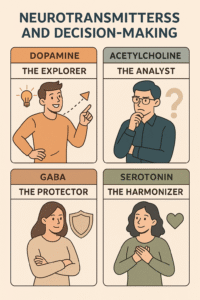Why do some people leap into the unknown while others hesitate? The answer lies partly in your brain chemistry. Neurotransmitters not only influence emotions—they shape the very core of how we decide.
Dopamine: The Explorer
Dopamine-dominant individuals are often bold, innovative, and action-oriented. They’re drawn to risk and novelty and may act before thinking. This impulsiveness can be a strength in creative or entrepreneurial roles—but may also lead to burnout or poor impulse control. Source: Zald et al., 2008
Acetylcholine: The Analyst
These thinkers analyze every angle. Acetylcholine dominance brings strategic depth, exceptional memory, and cautious decision-making. However, under pressure, they may overanalyze and get stuck in decision paralysis. [Source: Braverman, 1997]
GABA: The Protector
Low impulsivity, emotional regulation, and a preference for certainty characterize GABA-dominant types. They thrive in roles that require reliability and structure, but may avoid necessary risks. Source: Möhler, 2012
Serotonin: The Harmonizer
Empathetic and social, serotonin types weigh the emotional and relational consequences of decisions. This makes them collaborative leaders but sometimes overly influenced by others’ opinions. Source: Crockett et al., 2010
Application
Once you identify your decision-making style, you can:
- Choose careers that align with your strengths
- Balance your team with complementary thinkers
- Use targeted supplementation to support mental flexibility
